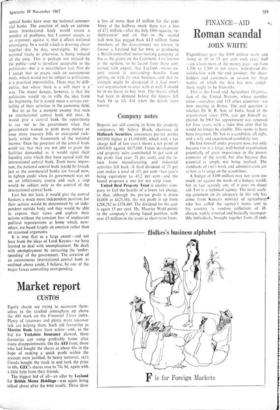Market report
CUSTOS
Equity shares are trying to accustom them- selves to the rarefied atmosphere up above the 400 mark on the Financial Times index. Plenty of takeovers and plenty more takeover talk are helping them. Such old favourites as Martins Bank have been active—and, as the bid for Yorkshire Insurance showed, these favourites can romp profitably home after many disappointments. On the AEI front, those who had bought the shares at about 66s in the hope of making a quick profit within the account were justified. In heavy turnover, AEI'S. friends bought the stock in and took the price to 69s. GEC's shares rose to 74s 9d, again with a little help from their friends.
The biggest bid of all—an offer by Leyland for British Motor Holdings—was again being talked about after the BMH results. These show a loss of more than £3 million for the year. Since at the halfway mark there was a loss
of £74 million—after the July 1966 squeeze, 're-
deployment' and all that—in . the second half BMH has pegged back £4.3 million. Some members of the Government are known to favour a Leyland bid for BMII, as producing a British-controlled motor-making company as big as the giants on the Continent. Less known is the opinion, to be heard from those con- cerned with export, that Leyland—whose ex- port record is outstanding—benefits from getting on with its own business, and that its strength might be dissipated if it had BMWS vast organisation to cope with as well. I should be in no hurry to buy BMH. The shares, which had been in demand before the figures, fell back 6d to 13s 4-ld when the details were known.
Company notes
Reports are still coming in from the property companies. Mr Sidney Bloch, chairman of Hallmark Securities, announces pre-tax profits £60,000 higher at £1,098,000, which with a tax charge half of last year's shows a net profit of £895,000 against £617,000. Estate development and property sales contributed 36 per cent of the profit (last year: 21 per cent), and the re- turn from manufacturing and industrial activities fell back.- A final dividend of 25 per cent makes a total of 471 per cent—last year's being equivalent to 45.2 per cent—and the board proposes a one for ten scrip issue.
United Real Property Trust is another com- pany to feel the benefit of a lower tax charge, so that, although the pre-tax profit is down £6,000 at £625,384, the net profit is up from £288,292 to £378,480. The dividend for the year is again 15 per cent. Mr. Maurice Wohl points to the company's strong liquid position, with over £3 million in the assets as short-term loans.






































 Previous page
Previous page